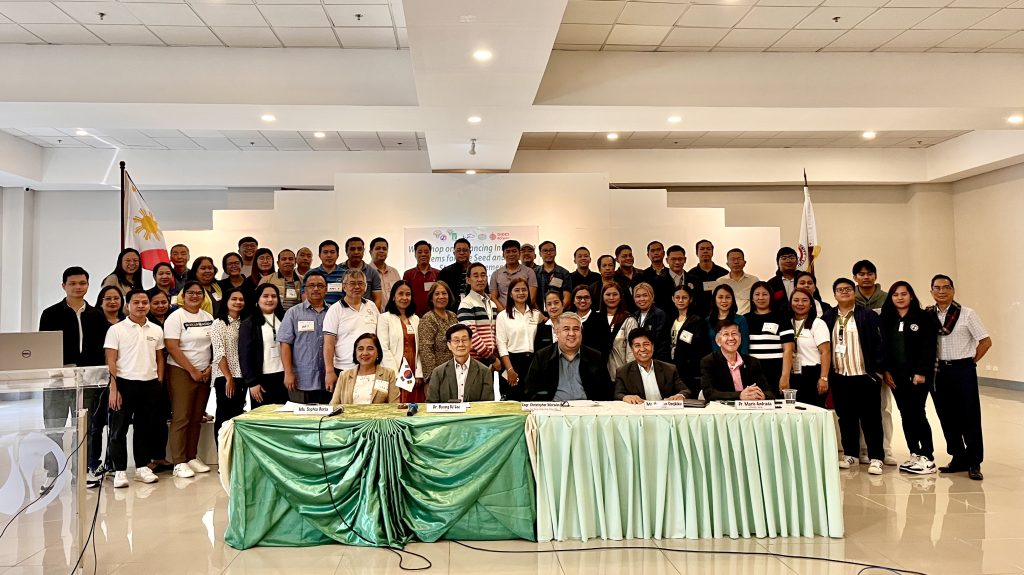
The Department of Agriculture–Philippine Rice Research Institute (DA-PhilRice) and the Bureau of Plant Industry (BPI) are gearing up for the nationwide rollout of the Rice Seed Information System (RSIS)—a digital platform that will transform how rice seeds are tracked, certified, stored, and distributed in the country.
RSIS is designed to connect all registered seed growers, producers, certification bodies, and warehouses through a centralized platform, enabling real-time monitoring of seed production, inspection, inventory, and movement.
By 2027, the system is expected to be fully powered by artificial intelligence (AI), Internet of Things (IoT), and automation technologies, making it one of the most advanced agricultural data networks in Southeast Asia.
“We are looking forward to AI revolutionizing RSIS. One of the goals is to connect all seed warehouses for smarter, faster operations,” said Arturo C. Arocena Jr., PhilRice information technology officer, in a recent workshop on Advancing Information Systems for Rice Seed and Buffer Stock Management held at the NFA Multi-Purpose Hall in Quezon City.
The workshop was organized by Orient Integrated Development Consultants, Inc. (OIDCI) and the Global Agriculture Policy Institute (GAPI) as part of a broader capacity-building component under the project titled “Improving the Rice Supply Chain to Ensure Quality of Rice Seeds and Milled Rice for Distribution and Buffer Stocks in the Philippines.”
This project, granted to PhilRice as an Official Development Assistance (ODA) from South Korea’s Ministry of Agriculture, Food, and Rural Affairs (MAFRA), is funded through the Korea Rural Community Corporation (KRC) and implemented through GAPI.
Since its pilot in 2022, RSIS has made steady progress. From May 2024 to May 2025 alone, 1,309 individuals were trained on the system—1,024 of them seed growers, 235 seed inspectors, and 50 representatives from DA, state universities and colleges, and PhilRice. It has also engaged 75 seed grower cooperatives and associations across 16 regions.
Despite these efforts, the project team says this is just the beginning.
“We’ve only reached about 20% of our target seed growers and inspectors. There are roughly 4,500 accredited seed growers and over 1,000 deputized inspectors from the LGUs, and half of these are designated inspectors and laboratory personnel under BPI. You can imagine the scale we need to cover,” said Fidela P. Bongat, head of PhilRice’s Business Development Division and RSIS project lead.
The platform enables users to manage the full seed value chain—from production planning to certification, inspection, postharvest monitoring, warehouse inventory, and even seed distribution. All of these can be accessed through mobile or web applications.
Early users describe the system as user-friendly and efficient, although PhilRice acknowledges that some, particularly those less familiar with digital tools, require additional support. To address this, the RSIS team is continuously conducting orientations and hands-on training.
“The RSIS is not just a record-keeping tool. It’s a game-changer that will enable faster, more transparent decisions in seed production and distribution. We are committed to guiding our stakeholders as we scale up,” Bongat said.
The initiative also aligns with the DA’s broader strategy to strengthen the country’s seed system.
DA Undersecretary for Rice Industry Development Engr. Christopher V. Morales stressed that technology must go hand in hand with yield improvement.
“Achieving the highest palay yield is not enough. Our seed systems must be resilient, responsive, and adaptive,” Morales said, citing the need for integrated facilities and digital tools to ensure high-quality seeds are viable and accessible when farmers need them most.
To sustain this effort, PhilRice and BPI have prepared a joint proposal aimed at institutionalizing RSIS and investing in the necessary infrastructure and policies to support its long-term operation. This will strengthen the country’s rice seed supply chain by making it easier for farmers to access certified seeds, improving coordination among agencies, and ensuring that quality seeds are accessible.




